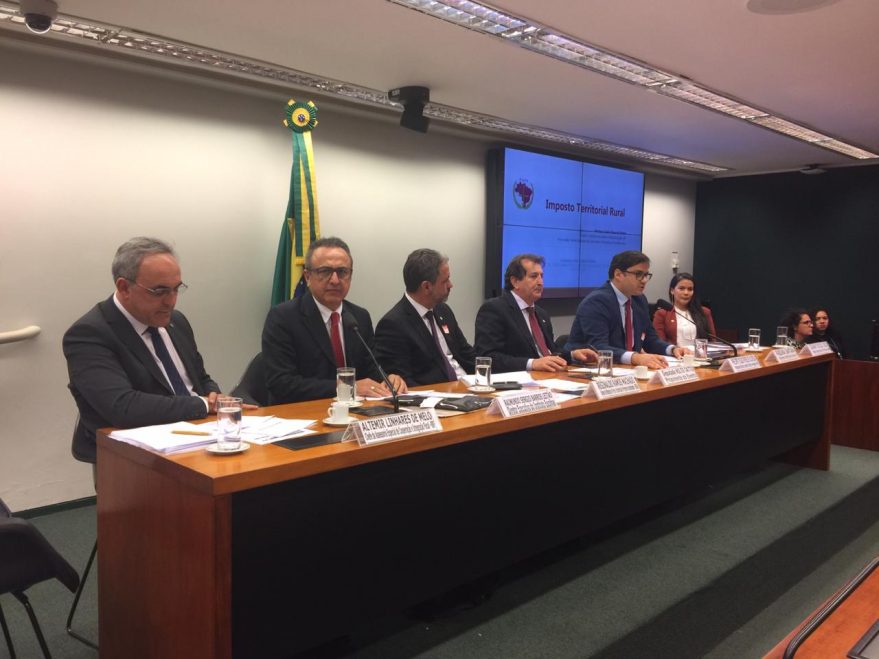Deputies debate Rural Territorial Tax in the House of Representatives

Tax updates proposed by recent study by Escolhas Institute were the subject of a public hearing at the Environment and Sustainable Development Commission in Brasilia
On August 28, federal deputies met in a public hearing at the House of Representatives in Brasilia to discuss changes in the Rural Territorial Tax (ITR). Among the contents that led to the discussion were the results and proposals of the study Rural Territorial Tax: tax justice and environmental incentives, which recommends updating the parameters and a new formula for collecting ITR in Brazil.
The hearing was initiated by Deputy Rodrigo Agostinho (PSB-SP), chairman of the Committee on the Environment and Sustainable Development of the House of Representatives, and was attended by experts on the subject, representatives of the federal government and representatives of different parties and groups, as the Environmentalist Parliamentary Front and the Agricultural Parliamentary Front, besides the founder and executive director of the Escolhas, Sergio Leitão, first to present himself at the table.
At the opening, the director highlighted one of the main arguments presented in the study: the current ITR collection is insignificant compared to its potential. Updates to calculations, metrics and lagged tables would multiply this collection up to 10 times, with direct positive impacts on the Union coffers and municipalities public accounts.
As information from the study shows at the hearing, last year the 1.58 million ITR paying rural properties in the country raised only R$ 1.5 billion. In comparative terms, only the property tax in the city of São Paulo collected R$ 10 billion in the same period.
Sergio Leitão noted that the ITR is less perceived by society for something that is fundamental, tax justice or fiscal justice, explaining that the tax is the rural correspondent to what we have for urban property, IPTU, or automotive property, IPVA.
“Everyone pays IPTU and IPVA. Paying taxes is part of our obligations to the State, so it fulfills its obligations to society. So it’s a two-way street. Therefore, from the point of view of fiscal justice, which is the contribution that each one of us, particularly as individuals, or looking at the activities that we develop in business, should have towards the country, because the ITR collects so little?”, asked Leitão.
With this, the director of Escolhas presented some of the study’s diagnoses that point out these causes, such as the fact that the ITR is self-declared by the owner and, therefore, often always depreciated; or that the Livestock Stocking table, which is the rural property productivity meter adopted for the calculation of the tax, has been frozen since the 1980s, among others.
::: See more details in the study Rural Territorial Tax: tax justice and environmental incentives.
At the end of his presentation, Leitão highlighted how “this all leads to a scenario of tax injustice”. He concluded: “We have the economic capacity of a sector, vital to the country’s economy, that does not make the contribution that can be made. This sector needs to pay tax on the land it has, because that is how it is done from the point of view of justice. If we pay for urban land ownership, the countryside also needs to do so. ”
In addition to Sergio Leitão, the meeting was attended by Deputy Nilto Tatto (PT-SP), chairman of the Environmental Parliamentary Front and requesting the hearing; Fabiana Santana, from the Economic Center of the National Confederation of Municipalities (CNM); Phelippe Toledo Pires de Oliveira, Deputy Attorney General for Tax and Social Security Consulting at the Attorney General’s Office of the National Treasury (PGFN); Altemir Linhares de Melo, Head of the Special Advisory Office for Cooperation and Fiscal Integration of the Brazilian Federal Revenue Secretariat; Reginaldo Ramos Machado, Director of Land Collection and Settlement Project Implementation at INCRA; and Djalmary de Souza e Souza, president of the National Union of Agrarian Federal Experts (SindPFA), who, followed Sergio Leitão presentation, corroborated some of his points.
The expert explained, for example, that in Brazil ITR represents only 0.1% of the Federal Goverment´s revenue, while in several other countries with similar contexts and profiles of rural production, such as Uruguay, such taxes represent 4% to 6% of the collection.
Another piece of information presented at the hearing, which confirms one of the main messages of Escolhas study – ITR’s great potential to contribute to municipal revenue – is the information that “93% of the tax collection currently comes from the municipalities agreed to the Internal Revenue Service, that is, they already do the municipal management of the tax ”, according to Altemir Linhares de Melo, head of the Special Advisory Office for Cooperation and Fiscal Integration of the IRS.
As the ITR is a municipal tax, at least 50% of the collected revenue goes to the municipalities where the property is located. When the municipality has an agreement with the IRS and becomes responsible for collection and supervision, as in the cases cited by Melo, 100% of the funds are in the City Hall’s coffers, which explains the engagement and large participation of these municipalities directly benefited in this process.
::: See the full hearing on TV Câmara’s YouTube channel.
At the end of the hearing, in an interview with TV Câmara, Deputy Nilto Tatto announced that he is gathering signatures of deputies to suggest changes to the ITR in the Tax Reform, which is under consideration in the House.
Related
Brazil attended COP-6 in Minamata without presenting an action plan to address mercury usage in mining
Study shows 2,274% increase in herbicide use for soybean production
Technical assistance is prevalent in legal regulations and public policies; however, a study indicates that it does not adequately reach rural producers
Study reveals Brazil applies pesticides and fertilizers inefficiently and unsustainably in soybean farming

 Texto
Texto